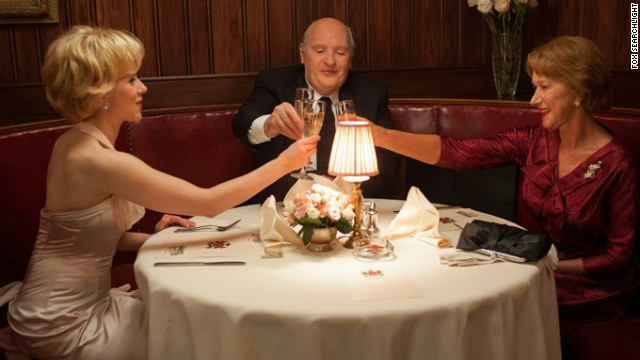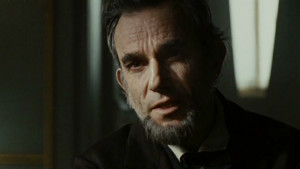
- Anthony Hopkins stars as the famous director Alfred Hitchcock
- Helen Mirren plays Hitchcock's long-suffering wife, Alma Reville
- Alma is the true hero of the story, according to the critic
- "Hitchcock" chooses to demonize the artist, he says
(CNN) -- Alfred Hitchcock, one of the most famous film directors in the world, has re-emerged into the zeitgeist this year.
In August, Hitchcock's from its perch at the top of the prestigious Sight & Sound list of the greatest films ever made. There also had been renewed interest in "Psycho" on its 50th anniversary two years ago as well as the release of shiny new Blu-ray packages of his films.
But not all the attention has been flattering. In September, HBO's film "The Girl" dramatized Tippi Hedren's behind-the-scenes horror stories from the making of "The Birds" (1963). According to the movie, Hitchcock was obsessed with his protege and sexually abusive.
And now comes "Hitchcock," an Oscar wannabe scripted by John J. McLauglin ("Black Swan") and directed by Sacha Gervasi ("Anvil"), with Anthony Hopkins as the portly English master of suspense and Scarlett Johansson (very good) as "Psycho" star Janet Leigh. (By the way, Hitch never won an Academy Award -- until the academy sheepishly coughed up a lifetime achievement consolation prize.)
 Prognosticating the Oscars
Prognosticating the Oscars
The movie begins, not unpromisingly, with Ed Gein murdering his older brother and Hitchcock stepping in to the frame to deliver one of his mordantly witty teasers. It's a cute joke, but it soon turns sour in facile scenes featuring the tormented and delusional Hitch confiding to an imaginary Gein, presented here as a soul mate, confessor and psychiatrist all rolled into one. It's a terrible idea, and all the more insidious because of the casting: Hopkins' most famous role remains Hannibal Lecter, and "The Silence of the Lambs" was influenced by Gein's macabre penchant for taxidermy.
Certainly, one of the things that makes "Psycho" such a great film is that it takes this monstrous, deviant figure, Norman Bates, and forges a human connection, a slender cord of attraction and empathy between him and Leigh's character, Marion Crane. For all his eccentricity, Anthony Perkins plays Norman as a sensitive, vulnerable, even kindly soul, at the mercy of compulsions he does not comprehend or control. Hitchcock, through his art, humanized a monster.
"Hitchcock," on the other hand, chooses to demonize the artist, finding something suspect and distasteful in his pursuit of the Gein story -- itself turned into a kind of obsession -- even as it plays the studio head's dismay for self-congratulatory laughs and cannibalizes Hollywood history. In the most ludicrous scene, the director loses all self-control while wielding a prop knife in the vicinity of a naked Leigh (no matter that the famous shower scene employed a body double).
While Hopkins' fearful, arrogant, rather pathetic Hitchcock seizes on "Psycho" to persuade himself he's not over the hill (after all, in the previous five years he only had "Rear Window," "Vertigo," "North by Northwest" and "The Wrong Man" and a couple more masterpieces to his name), his long-suffering wife, Alma Reville (Helen Mirren), watches from the sidelines as he mortgages their home, flirts with Leigh -- his latest blonde -- and pushes back the standards of taste and decency in American cultural life.
Alma is indulgent, but only up to a point. She permits herself to embark on a collaboration with a gallant writer friend (Danny Huston), a gesture of artistic independence that Hitch perceives as infidelity, tantamount to adultery.
Mirren's pursed, patient, discreet Alma is the real hero of this story. She is not just her husband's sounding board but also his best (uncredited) co-writer, his (uncredited) editor and even his (uncredited) co-director. There is probably some sliver of truth to this, but "Hitchcock" plays so fast and loose with the facts it's highly unreliable. And in championing the overlooked Alma, it not only denigrates Hitchcock's reputation but it also slights his many other collaborators, too, including the work of author Robert Bloch, editor George Tomasini and composer Bernard Herrmann.
What's worse, this mild, mediocre act of feminist revisionism seems oblivious to the very real, enduring and profound power of "Psycho," which is so much more than just an effective scare machine. If you really want to see an honest movie about Hitchcock's troubled, fetishistic, conflicted, love-hate relationship with women, see "Psycho," "Vertigo," "Marnie" or "Notorious" -- it's a film he made over and over again his whole life, and better than anyone else ever will.